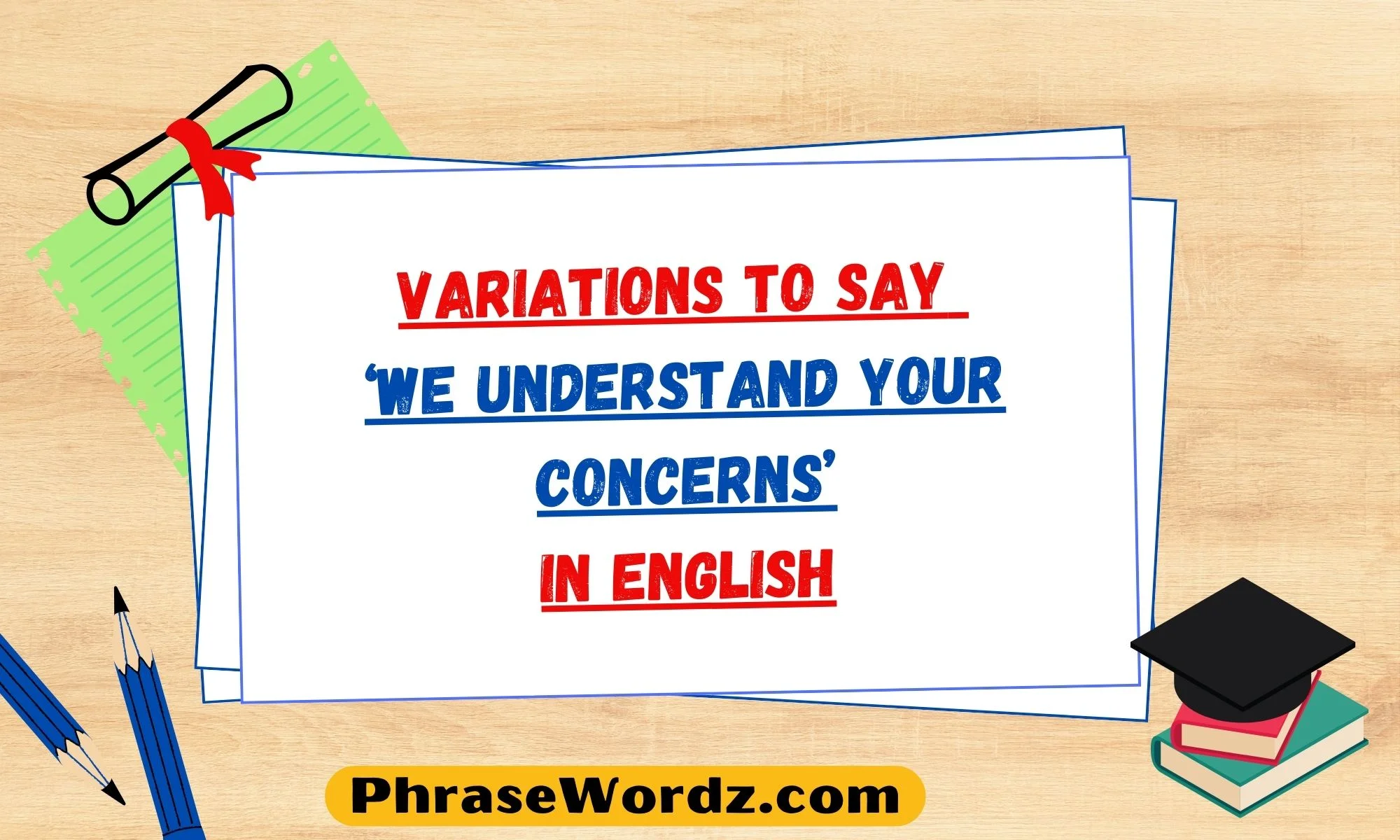Explicit empathy and understanding are crucial for effective communication in professional and personal interactions. Instead of repeating, “We understand your concerns,” explore polished variations to convey empathy and professionalism.
Explore our guide on “We Understand Your Concerns in English” to master empathetic and professional communication. Learn effective phrases to address concerns with care, clarity, and confidence in any formal or casual interaction.
This article provides examples, suitable scenarios, and actionable phrases to elevate your communication style.
Top Variations to Say ‘We Understand Your Concerns’ in English
- We Acknowledge Your Concerns
- We Hear You
- We Appreciate Your Feedback
- We Recognize Your Perspective
- We Understand How Important This Is to You
- We Take Your Concerns Seriously
- We Value Your Input
- We See Where You’re Coming From
- We Want to Assure You That Your Concerns Are Valid
- Your Concerns Are Important to Us
- We Empathize With Your Situation
- We Are Listening Closely
- We’re Committed to Addressing Your Concerns
- We Understand This May Be Frustrating
- We Acknowledge the Challenges You’ve Mentioned
- We Are Here to Support You
Content with Scenario Examples
1. We Acknowledge Your Concerns
This phrase shows that you’ve actively received and noted the other party’s worries.
Scenario Example (Email):
Subject: Follow-Up on Your Feedback
Dear Mr. Carter,
Thank you for reaching out to share your feedback regarding the recent project timeline. We acknowledge your concerns about the delay and its potential impact on your goals. Please rest assured, our team is actively reviewing the situation to ensure this is resolved promptly.
Warm regards,
Elizabeth
2. We Hear You
This simple yet direct phrase emphasizes that their voice matters.
Scenario Example (Email):
Subject: Your Recent Inquiry
Hi Darcy,
Thank you for your email. We hear you, and we understand that waiting for a resolution has been difficult. Our team is working diligently to address the issue, and I’ll provide an update by Friday. Please let me know if there’s anything else I can assist you with.
Best,
Elizabeth
3. We Appreciate Your Feedback
This phrase reinforces gratitude while addressing concerns.
Scenario Example (Customer Support Response):
Dear Ms. Taylor,
Thank you for your feedback regarding the new app update. We appreciate your feedback and value your insights into improving the user experience. Our development team is already working on enhancements based on customer suggestions like yours. We’ll notify you once updates are implemented.
Kind regards,
Elizabeth
4. We Recognize Your Perspective
This phrase fosters a connection by acknowledging their viewpoint.
Scenario Example (Email):
Subject: Clarification on Policy Change
Dear Team,
I want to address your concerns regarding the recent policy updates. We recognize your perspective on how this might affect workflow and are considering adjustments to accommodate everyone’s needs. Your cooperation is invaluable as we navigate this change together.
Sincerely,
Elizabeth
5. We Understand How Important This Is to You
This variation emphasizes empathy and understanding.
Scenario Example (Formal Letter):
Dear Mr. Smith,
Thank you for contacting us. We understand how important this is to you and are fully committed to finding a solution that aligns with your expectations. Please allow us two business days to provide a comprehensive response.
Best regards,
Elizabeth
6. We Take Your Concerns Seriously
This variation highlights attentiveness and commitment to resolution.
Scenario Example (Email):
Subject: Immediate Attention to Your Issue
Dear Darcy,
Thank you for bringing this to our attention. We take your concerns seriously, and I have escalated the matter to our management team. You’ll hear from us with a solution by tomorrow afternoon.
Regards,
Elizabeth
7. We Value Your Input
This phrase reinforces the importance of their contribution.
Scenario Example (Project Feedback Email):
Hi Team,
Thank you for the constructive feedback during yesterday’s meeting. We value your input, and it will be instrumental in refining the project’s direction. Please don’t hesitate to share additional suggestions as we move forward.
Warm regards,
Elizabeth
8. We See Where You’re Coming From
This phrase fosters mutual understanding.
Scenario Example (Dispute Resolution Email):
Subject: Resolving Your Concerns
Dear Mrs. Green,
Thank you for explaining your situation. We see where you’re coming from and are actively looking into how we can accommodate your specific requirements. Please expect a detailed response by Wednesday.
Kind regards,
Elizabeth
9. We Want to Assure You That Your Concerns Are Valid
This emphasizes validation and reassurance.
Scenario Example (Customer Complaint Response):
Dear Mr. Lee,
Thank you for your message. We want to assure you that your concerns are valid, and we are taking immediate steps to resolve the issue. Our team will follow up with an update by the end of the day.
Best regards,
Elizabeth
10. Your Concerns Are Important to Us
This phrase demonstrates respect and attentiveness.
Scenario Example (Service Follow-Up Email):
Subject: Ensuring Your Satisfaction
Hi Darcy,
Thank you for sharing your thoughts on our service. Your concerns are important to us, and we’re committed to ensuring your satisfaction. Our support team is reviewing your case and will follow up soon.
Warm regards,
Elizabeth
11. We Empathize With Your Situation
This variation emphasizes compassion.
Scenario Example (Response to Escalated Issue):
Dear Ms. Brown,
Thank you for reaching out. We empathize with your situation and regret any inconvenience caused. Our team is prioritizing your case, and we’ll provide a resolution within 24 hours.
Kind regards,
Elizabeth
12. We Are Listening Closely
This phrase demonstrates active engagement.
Scenario Example (Email):
Subject: Follow-Up on Your Request
Hi Darcy,
Thank you for your detailed input. We are listening closely and aim to provide the adjustments needed to meet your expectations. Please bear with us as we finalize the updates.
Best,
Elizabeth
13. We’re Committed to Addressing Your Concerns
This phrase underscores dedication to resolution.
Scenario Example (Email):
Dear Mr. Carter,
Thank you for highlighting this issue. We’re committed to addressing your concerns and will keep you informed of progress at every step. Our team is currently evaluating the best course of action.
Sincerely,
Elizabeth
14. We Understand This May Be Frustrating
This variation acknowledges emotions while reassuring resolution.
Scenario Example (Email):
Hi Darcy,
We understand this may be frustrating, and we appreciate your patience. Our team is actively working on your case and will provide a comprehensive update by tomorrow. Thank you for allowing us the opportunity to improve.
Warm regards,
Elizabeth
15. We Acknowledge the Challenges You’ve Mentioned
This shows awareness of specific obstacles they face.
Scenario Example (Email):
Subject: Response to Your Concerns
Dear Mrs. Taylor,
Thank you for explaining the difficulties you’re experiencing. We acknowledge the challenges you’ve mentioned and are committed to assisting you in overcoming them. Let’s schedule a call to discuss potential solutions.
Best regards,
Elizabeth
16. We Are Here to Support You
This closing variation highlights availability and support.
Scenario Example (Email):
Dear Mr. Green,
We appreciate your message. We are here to support you and will do everything possible to address your concerns effectively. Please feel free to reach out anytime if additional assistance is needed.
Kind regards,
Elizabeth
Conclusion
Using these 16 thoughtful variations allows you to address concerns effectively while showcasing empathy and professionalism. Incorporating these phrases into emails, calls, or meetings can build trust and improve communication. Choose the variation that best fits your tone and context to make every interaction meaningful.











